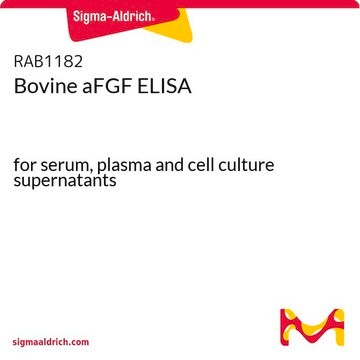11585878001
Roche
hGH ELISA
sufficient for 192 tests, >98% (SDS-PAGE), kit of 1, suitable for ELISA
Sinónimos:
ELISA
About This Item
Productos recomendados
Ensayo
>98% (SDS-PAGE)
uso
sufficient for 192 tests
envase
kit of 1
fabricante / nombre comercial
Roche
técnicas
ELISA: suitable
temp. de almacenamiento
2-8°C
Descripción general
hGH Standards
The hGH protein from E. coli, included in the kit for the purpose of compiling a standard calibration curve, is provided with lot-specific content data as determined by immunoassay.
Using the standard isotopic protocol, secretion of hGH protein into the culture-medium supernatant can be monitored approximately 24hours post-transfection, depending on the cell type and the sensitivity of the assay used. Usually, hGH is quantified by an immunoradiometric assay (IRMA), resulting in a linear range of approximately 0.1 to 50ng hGH/ml.
Especificidad
Aplicación
Características y beneficios
- Standardized: Allows direct comparison of data from different sets of experiments, even when kits from different production lots are used
- More sensitive: The hGH ELISA is approximately 20-times more sensitive than isotopic hGH assays
- More specific: The hGH ELISA shows no crossreactivity with rat growth hormone
- Faster: Measures hGH expression as early as 18hours post-transfection and requires only approximately 4 hours from start to finish
- Easy to perform: Follows a standard ELISA protocol
Envase
Especificaciones
Sample material: Culture supernatant
Sensitivity: ≥5pg/ml (≥1pg/well)
Standards: The hGH protein from E. coli, included in the kit for the purpose of compiling a standard calibration curve, is provided with lot-specific content data as determined by immunoassay.
Principio
Nota de preparación
Reconstitute the lyophilizate in 0.5 ml double distilled water. The resulting concentration is calculated using the lot-specific information, given on the label (final conc. approx 10 ng/ml). This solution is used for the preparation of hGH standards for establishing a hGH calibration curve (see 7.2: preparation of hGH standards).
Solution 2 Anti-hGH-DIG (bottle 2)
Reconstitute the lyophilizate in 0.5 ml double distilled water (final conc. 100 μg/ml).
Solution 2a Anti-hGH-DIG, working dilution
To prepare anti-hGH-DIG working dilution, dilute the reconstituted anti-hGH-DIG solution (100 g/ml) with sample buffer (solution 7) to a final conc. of 1 μg/ml (e.g., 100 μl of reconstituted anti-hGH-DIG solution 9.9 ml of solution 7 for 50 wells).The working dilution should be prepared freshly before use and should not be stored.
Solution 3 Anti-DIG-POD (bottle 3)
Reconstitute the lyophilizate in 0.5 ml double distilledwater (final conc. 20 U/ml). Do not add sodiumazide!
Solution 3a Anti-DIG-POD, working dilution
To prepare anti-DIG-POD, working dilution, dilute the reconstituted anti-DIG-POD solution (20 U/ml) with sample buffer (solution 7) to a final conc. of 200 mU/ml (e.g., 100 μl of reconstituted anti-DIG-POD solution 9.9 ml of solution 7 for 50 wells). The working dilution should be prepared freshly before use and should not be stored.
Solution 4 POD Substrate (bottle 4)
Ready-to-use solution.
Solution 5 POD Substrate containing Substrate Enhancer (bottles 4 and 5)
If a low hGH concentration in the sample is expected, add 1 mg of substrate enhancer (bottle 5) per ml of solution 4 and mix by stirring for 30 min at 15 to 25 °C. The solution is stable for only 2 hours and should therefore be prepared immediately before use. Use the substrate enhancer only if the hGH concentration is low!
Solution 6 Washing Buffer, 1× (bottle 6)
To prepare a ready-to-use washing buffer, mix 1 part 10x washing buffer concentrate (bottle 6) with 9 parts of double distilled water.
Solution 7 Sample Buffer (bottle 7)
The solution is ready-to-use. Mix thoroughly before use. Do not add sodium azide.
Storage conditions (working solution): Solution 1 hGH Stock Solution (bottle 1)
The reconstitutedsolution is stable for 2 months at 2 to 8 °C. For long term storage, store in aliquots at or below -15 to -25 °C.
Solution 2 Anti-hGH-DIG (bottle 2)
The reconstituted solution is stable for two months at 2 to 8 °C. For long term storage, store in aliquots at or below -15 to -25 °C.
Solution 2a Anti-hGH-DIG, working dilution
The working dilution should be prepared freshly before use and should not be stored.
Solution 3 Anti-DIG-POD (bottle 3)
The reconstituted solution is stable for 6 months at 2 to 8 °C. Do not freeze!
Solution 3a Anti-DIG-POD, working dilution
The working dilution should be prepared freshly before use and should not be stored.
Solution 4 POD Substrate (bottle 4)
The solution is stable until the expiration date given on the label if stored at 2 to 8 °C.
POD Substrate containing Substrate Enhancer (bottles 4 and 5)
The solution is stable for only 2 hours and should therefore be prepared immediately before use.
Solution 6 Washing Buffer, 1× (bottle 6)
The reconstituted solution is stable for 6 months at 2 to 8 °C.
Solution 7 Sample Buffer (bottle 7)
After opening the bottle we recommend storing the solution in aliquots at -15 to -25 °C, since it does not contain a preservative agent.
Nota de análisis
Otras notas
Solo componentes del kit
- hGH (human growth hormone)
- Anti-hGH-digoxigenin (anti-hGH-DIG) antibody, lyophilizate
- Anti-Digoxigenin-POD antibody, lyophilizate
- POD Substrate ready-to-use
- Substrate Enhancer
- Washing Buffer 10x concentrated
- Sample Buffer
- Microplates (24x8 wells), precoated with anti-hGH (2)
- Self-adhesive Plate Cover Foils (6)
Palabra de señalización
Warning
Frases de peligro
Consejos de prudencia
Clasificaciones de peligro
Aquatic Chronic 3 - Eye Irrit. 2 - Skin Sens. 1
Código de clase de almacenamiento
12 - Non Combustible Liquids
Clase de riesgo para el agua (WGK)
WGK 3
Punto de inflamabilidad (°F)
does not flash
Punto de inflamabilidad (°C)
does not flash
Elija entre una de las versiones más recientes:
¿Ya tiene este producto?
Encuentre la documentación para los productos que ha comprado recientemente en la Biblioteca de documentos.
Nuestro equipo de científicos tiene experiencia en todas las áreas de investigación: Ciencias de la vida, Ciencia de los materiales, Síntesis química, Cromatografía, Analítica y muchas otras.
Póngase en contacto con el Servicio técnico









